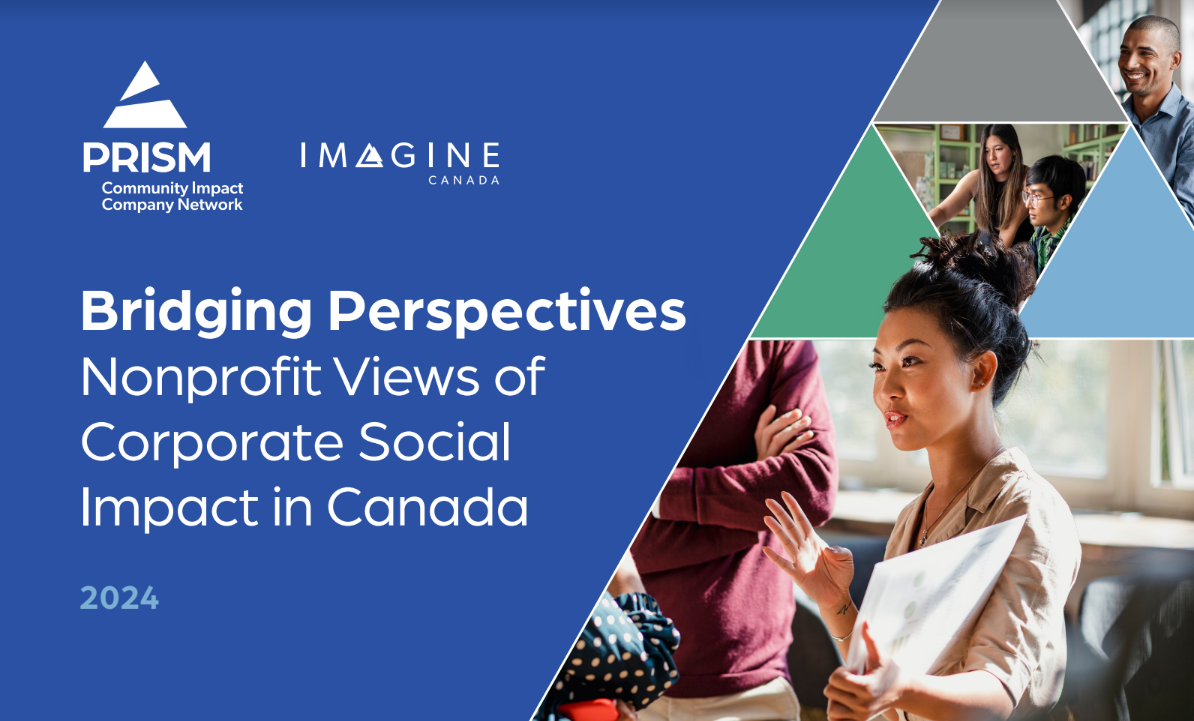Nonprofit Views of Corporate Social Impact in Canada

Bridging Perspectives: Nonprofit Views on Corporate Social Impact in Canada is a first of its kind study to explore nonprofit perceptions and expectations on corporate social impact and community partnerships. Findings are drawn from a survey of over 900 Canadian nonprofit organizations and have been weighted by size and region to ensure sector representation.
The project, conducted by Imagine Canada and Ignite Research, allows the nonprofit sector to openly share diverse perspectives on corporate practices, partnerships, and aspirations for the future. In addition, the report highlights companies viewed as leaders in social impact and nonprofit partnership.
NEW STUDY

Despite some skepticism about corporate impact in Canada shown in the study, when cross-sectoral partnerships are in place the confidence for the business sector to drive positive change increases substantially, and a number of companies and industries are leading the way in building strong collaborations and reputations for social impact.
- Nonprofit professionals want the corporate sector to commit to higher levels of income contributions over the coming decade.
- Despite the need for increased funding, 69% indicate that there are certain companies or industries from which they would not accept donations.
- There is a level of confidence in the corporate sector to have a positive impact, with 70% of respondents citing moderate trust in companies to make communities better. Notably, this trust level varies by industry, and improves significantly among nonprofit professionals that receive corporate support.
- When it comes to their corporate partnerships, nonprofits value strong relationships with individuals (81%) and long-term corporate relationships (79%), significantly more than the total amount of financial support provided (49%).
- Receiving unrestricted, core, and multi-year financial support from their corporate partners was highlighted as a practice that has significant impact on a nonprofit organization’s ability to achieve their mission.
- Where higher levels of trust exist, there is a stronger desire to collaborate and act as partners. Nonprofit professionals that trust the corporate sector would like to see more social advocacy and leveraging of nonprofit expertise to advance social change.
- The health sector wants the corporate sector to leverage their networks to catalyze philanthropy, placing high value on employee and consumer philanthropy initiatives nearly as strongly as they do direct financial support from companies.
Imagine Canada provides additional survey insights to companies in the PRISM Network. This includes specific insights related to companies named in the study, provided there is sufficient data to support analysis. For more details, contact us at [email protected].
Part of the reason [our corporate partner] is so amazing is the time they spend at our conferences finding out more about the issues… So many corporations look at narrow research and metrics and then assume they understand the issues. This is particularly the case around centering DEI in the program development or strategy.
– Study participant
The results from this study highlight the importance of educating and convening across sectors, creating forums for dialogue, and generating data-driven insights and tools for evaluation. If you're inspired by these results, we encourage your company to join the PRISM Network and shape the future of corporate philanthropy together.
- Reflect on the assets your company has at its disposal that may be of value to your community partners - beyond cash donations - such as services, expertise, or networks.
- Focus on the long-term outcomes of community partnerships rather than short-term gains or projects, thinking about how sustained support can create lasting impact.
- Consider how your company can learn from the expertise and experiences of nonprofit partners, and where there may be opportunity for deeper collaborations.
- Foster informal interactions and open dialogue through casual check-ins or social gatherings, helping to build rapport and trust on a personal level.
- Encourage open and honest communication, and invite feedback from your nonprofit partners on how the relationship and partnership outcomes can be improved.
- Actively promote your nonprofit partners in public forums and company communications to elevate their work among your leadership, employees, and customers.
- Support the long-term sustainability of nonprofit partners and projects by investing in organization capacity-building initiatives, such as research or infrastructure development.
- Publicly pledge a percentage of profits or resources to the community, and join a Certification program like PRISM or 1% for the Planet to reinforce your company’s commitment.
- Provide staff training on the challenges and opportunities facing nonprofit organizations and the communities you serve, recognizing not all will have the same expertise or knowledge.
Acknowledgement
This study was made possible thanks to the ongoing, generous support of RBC Foundation, YourCause from Blackbaud, and our national partners.

Advance the recommendations in the study by being part of a growing Canadian Network.
Joining the PRISM Community Impact Company Network connects you and your team to the peers, resources, and insights you need to lead.

